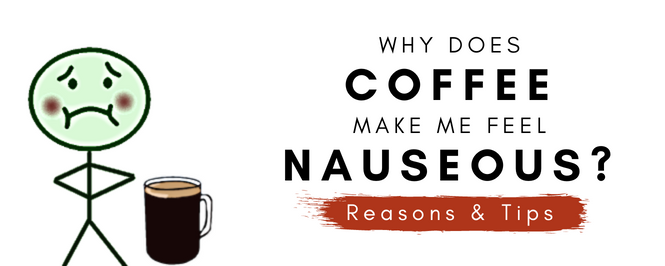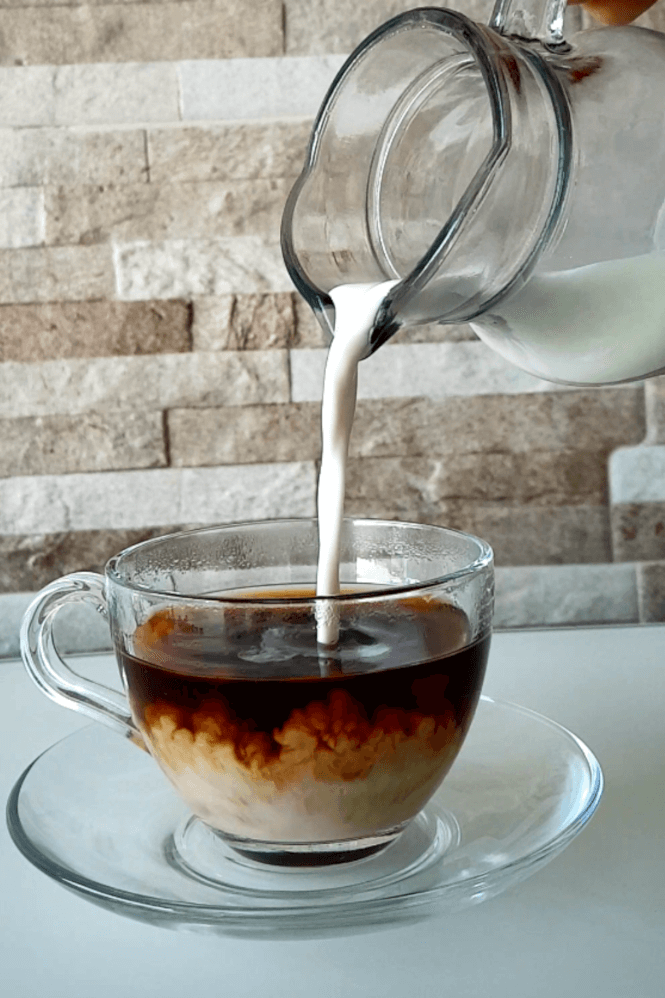Drinking a cup of Joe in the morning is a great start-of-the-day ritual that gets us energized.
Nevertheless, a few years back I started wondering why my coffee makes me feel nauseous all of a sudden.
I’d drink a cup or two in the afternoon and immediately feel sick and jittery without realizing what has caused this unexpected aversion to my favorite caffeinated beverage. Furthermore, it started affecting my anxiety levels more and more. As time went by, I began to feel bad even when sensing the smell of coffee.
I later found out that some people have always felt bad after drinking just one espresso shot, or an 8 oz. mug of coffee with a bit of milk.
Since I’ve never experienced this before, I knew that something has changed in the way I metabolize caffeine.
Or it was probably something to do with the amount of coffee I was having?
I started researching what may be the cause of the shaky and dizzy feeling that I’d get after having a cup. I found many reasons why people may experience such indispositions.
I knew that I needed to get rid of coffee nausea, as I couldn’t imagine my life without my all-time favorite drink.
In this article, you will find the causes of why you may be feeling bad after drinking coffee. Furthermore, you will find ways to eliminate the unpleasant feelings that you’re experiencing after having a cup.
So without further ado, let’s dive in!
Why does coffee make me feel sick?
If you’ve realized that coffee has started making you feel nauseous, I can assure you that it may be temporary, as it did make me feel bad for a while too, but it doesn’t now.
After doing thorough research, based on scientific reports, I found the reasons why this may be happening. We’ll go over said reasons and explore the ways to get rid of the weird feeling that follows drinking a cup of Joe.
So here are the causes of why coffee makes you nauseous:
- You have high caffeine sensitivity.
- You have had too much coffee.
- Your caffeine metabolizing activity is affected by a health condition/medication you’re taking.
- You are sensitive to acidic foods and drinks.
- You haven’t eaten before/after drinking coffee.
- You are dehydrated.
- You have coffee with too much sugar.
- You have a lactose intolerance.
1. You have high caffeine sensitivity
In other words, coffee makes you nauseous, because you’re highly sensitive to its active ingredient – caffeine.
The rate at which the body metabolizes caffeine varies from one individual to another.
In fact, genetics play a role in the function of enzymes that break down caffeine.
Some people metabolize caffeine more slowly, which is why they are highly sensitive to the effects of the stimulant.
If you’re a slow caffeine metabolizer, you may feel jittery, anxious, or even sick after drinking just a cup of coffee.
Contrarily, people who metabolize caffeine fast may not experience the effects of the stimulant.
This is one of the reasons why coffee doesn’t seem to wake them up, so they keep feeling tired even after drinking a huge cup of Joe.
Related Post: Why Doesn’t Coffee Wake Me Up: Reasons and Tips
If you have high caffeine sensitivity you are more likely to experience the negative consequences of caffeine consumption.
Some of the risks that are associated with coffee drinking are insomnia, restlessness, increased anxiety levels, and headaches.
So if you’ve always felt sick after having a cup of coffee – it may be your genes.
If that’s the case, you should try to limit your caffeine intake to avoid the negative consequences.
2. You have had too much coffee.
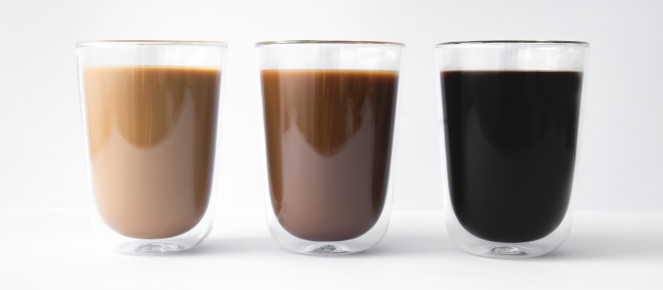
According to the FDA, a healthy individual shouldn’t consume more than 400 mg of caffeine per day.
This amount can be found in about 4 cups of coffee.
Nevertheless, the caffeine content of your beverage varies, depending on the brewing method and the serving size of your cup of Joe.
You can check out my article on which coffee has the most caffeine to get a better understanding of how much caffeine you’re actually consuming on a daily basis.
After all, we coffee lovers, tend to go overboard with the number of cups we have, without even noticing.
So if you’ve suddenly started to feel bad after drinking coffee, ask yourself whether you’ve had a bit too much.
When you go overconsume coffee, you may also experience increased anxiety levels.
To avoid that, you can switch your second cup of Joe with a cup of green tea or matcha.
You can find out why the energizing matcha is better than coffee for those who tend to get anxious after caffeine consumption in this article: Matcha vs. Coffee: The Ultimate Comparison.
You can also substitute your regular cup of Joe with half-caff to avoid the negative effects of caffeine overconsumption.
3. Your caffeine metabolizing activity is affected by a health condition/medication you’re taking.
Your genes undoubtedly play a role when it comes to the way coffee affects you.
Nevertheless, caffeine metabolism is also influenced by other individual factors.
Some of them are your health condition, weight, and whether you smoke, or take medication, such as contraceptives.
For example, pregnancy slows down caffeine metabolism.
It decreases clearance and excretion which is why caffeine tends accumulate in the body.
This may explain why pregnant women are more likely to get jittery and feel sick after drinking coffee.
For this reason, the permissible daily dose of caffeine during pregnancy shouldn’t exceed 200 milligrams.
The medication you’re currently taking may also affect the way you metabolize coffee.
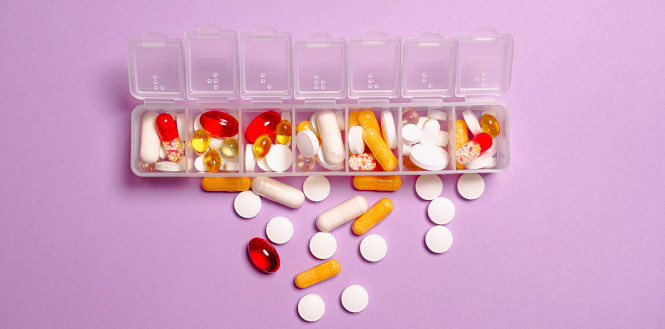
For instance, birth control pills slow down caffeine metabolism.
Therefore, some individuals who take contraceptives may experience headaches, increased heart rate, jitteriness, and overall – feel nauseous after drinking coffee.
All these variables, combined with your genes affect the half-life of caffeine in your body.
According to this study, it may range between 1.5 hours and 9.5 hours.
This may explain why some of you can’t sleep after drinking a cup of coffee at noon, while others would happily have an espresso at 8 PM, without it affecting their sleep.
With that being said, if you’ve suddenly started feeling bad after drinking coffee without a clear reason, it’s best to see a doctor.
Sometimes the sudden aversion to coffee has to do with more serious health conditions, such as stomach ulcers, allergies, or inflammation of the gallbladder.
In such cases, the indispositions that follow coffee consumption may aggravate the symptoms of your health issue.
So if you experience vomiting or abrupt stomach pains after a cup of coffee, you should undoubtedly consult a doctor.
Furthermore, if you’ve recently started taking medication and you feel bad after drinking a cup of Joe, you should check with your physician.
It’s essential to understand whether the drugs you’re taking interact with caffeine in a way that makes you feel weird.
4. You are sensitive to acidic foods and drinks.
If a pH value of a solution is below 7, then it’s considered acidic.
Coffee is a slightly acidic beverage with a pH that generally varies within the range of 4.85 to 5.13.
If you are more sensitive to acidic foods and drinks, you may feel nauseous and sick after drinking coffee.
Furthermore, coffee consumption is known to aggravate the symptoms of people with GERD.
These symptoms include acid reflux, heartburn, and the sensation of a lump in your throat.
According to to this systematic review about 20% of the population of the United States have gastroesophageal reflux disease (GERD).
So if you’ve been experiencing GERD symptoms after you’ve had your coffee, you may want to see a gastroenterologist and check on your health.
What’s also worth noting is that caffeine has been linked to an increased risk of acid reflux.
So the main culprit may not be the acidic nature of coffee, but rather its caffeine content.
For that reason many people with acid reflux switch to decaf to eliminate the unpleasant feeling that follows coffee consumption.
Related Post: Is Decaf Coffee Less Acidic?
To get rid of coffee nausea caused by the acidity of coffee, you may also want to switch to cold brew coffee, as it’s generally less acidic.
In this article you can find out more about why cold brew coffee may be better for people with GERD and acid reflux.
Don’t worry, if you’re not a fan of iced coffee. Cold brew can also be served hot, by diluting the concentrate with hot water.
Related Post: Cold Brew Coffee Guide: Step-by-step Instructions
5. You haven’t eaten before/after drinking coffee.
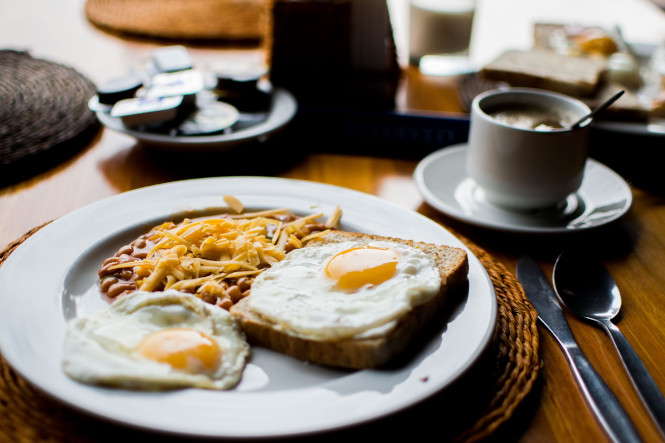
If you eat a well-balanced breakfast before your morning cup, or shortly after you’ve had your coffee, you will minimize the chances of the unpleasant feelings that follow coffee consumption.
If you have a more sensitive stomach, the protein and fiber in your breakfast will soak up the acidity and stabilize the release of caffeine in your blood vessels.
This will lead to a more sustainable energy release.
Furthermore, by making sure you’re not hungry when having your coffee, you may avoid increased anxiety levels and jitteriness that often follow coffee consumption.
6. You have coffee with too much sugar.
If you drink a highly sweetened caffeinated beverage, such as a Caramel Frappuccino from Starbucks, you may start feeling shaky or tired soon after you’ve had this drink.
This is so because the sweet condiments cause a fast rise in your blood sugar, which is followed by a sugar crash.
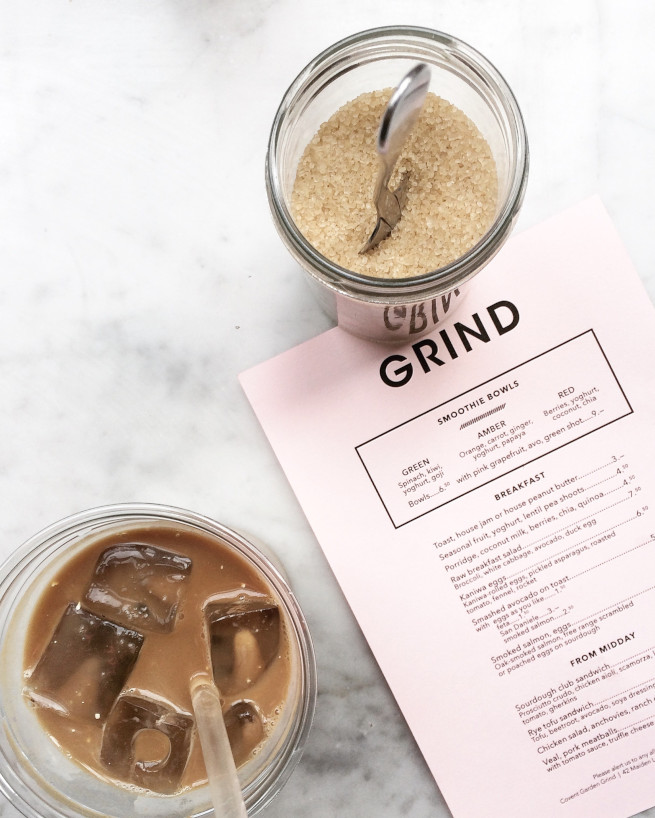
Eating breakfast or having a snack along with your coffee is beneficial if you drink your cup sweetened with sugar or flavored syrups.
When you’ve had a balanced meal before or soon after you’ve had the sugary beverage, the protein and fiber will slow down the sugar release in your blood.
This will eliminate the sudden rise and subsequent drop in energy levels, and you’ll feel much better and pleasantly energized after you’ve had your sweet coffee treat.
Of course, I’d ideally recommend having coffee without any sweeteners whatsoever.
I know that this may be hard at first, but there are ways to enjoy your cup of Joe without the addition of any sugar or sweet syrups and sauces.
There are several ways to do that.
You can switch to cold brew, which is generally less bitter and has a smoother flavor.
Furthermore, opting for specialty coffee beans with a pleasantly balanced flavor profile can make it easy for you to drink your coffee without sugar.
After all, generic coffee beans from the supermarket are usually more bitter and don’t taste quite well if you don’t add any condiments.
Related Post: Types of Coffee Beans: Beginner’s Guide
Another way to decrease coffee’s bitterness is to add a few grains of salt to your brew. To find out more about having coffee with salt, you can check out this article.
If you can’t imagine having coffee without any sweeteners, you can try substituting sugar with alternatives, such as Liquid Stevia Drops, or Erythritol Powder.
You can also check out my post on the Best Keto Coffee Syrups for recommendations on sugar-free coffee condiments that will add flavor to your cup of Joe.
7. You are dehydrated.

Nevertheless, that’s not entirely true, as there is evidence that coffee doesn’t have a diuretic effect on regular coffee drinkers.
Furthermore, while coffee may cause a slight increase in fluid excretion, the cup of Joe you’re drinking does contain liquid as well, right?
So the water your coffee contains, compensates for the slight diuretic effect of the caffeinated beverage.
Sure, if you have an espresso, which is more concentrated, the liquid it contains may not make up for the fluid loss.
However, if you have a glass of water along with your espresso shot, you wouldn’t get more dehydrated.
Related Post: Espresso vs. Ristretto vs. Lungo : The Comparison
In this scientific report you can see the following statement:
The most ecologically valid of the published studies offers no support for the suggestion that consumption of caffeine-containing beverages as part of a normal lifestyle leads to fluid loss in excess of the volume ingested or is associated with poor hydration status.
In other words, if you drink coffee daily, your habit won’t make you more dehydrated than you already are.
With that being said, many people tend to forget drinking a sufficient amount of water throughout the day.
Furthermore, heavy coffee drinkers would never skip having their usual cup of Joe, but they’d neglect the importance of having water to stay hydrated.
This may explain why you experience symptoms of dehydration after drinking coffee. Such symptoms include nausea, lethargy, and even fever.
So if you want to avoid feeling sick after drinking a cup of coffee, you should make sure that you’ve had enough water throughout the day.
Author’s Note: During my research I found some evidence that caffeine increases the excretion of calcium, magnesium, sodium and chloride.
Some of the symptoms of magnesium dificiency include nausea, general feeling of weakness and vomiting.
If you have magnesium depletion to start with, coffee consumption may aggravate this condition.
This may explain why you’re getting extra nauseous after drinking coffee.
8. You have a lactose intolerance.
If you’re used to drinking coffee with milk or creamer, and all of a sudden you start feeling nauseous and sick after your regular cup, you may have developed lactose intolerance.
Even if you’ve never suffered from this digestive issue in the past, it often develops as you get older.
Some of the symptoms related to lactose intolerance include diarrhoea, bloating, and an overall feeling of sickness.
You can check with a doctor to see whether you have lactose malabsorption.
If it turns out that this causes your sudden aversion to coffee, you may want to stay away from adding milk to your cup of Joe.
Another great alternative is to prepare or order your coffee with plant-based milk.
There are some great dairy milk substitutes, that result in delicious lattes, mochas, and flat whites.
You can even make your homemade drinks with a vegan whipped cream topping.
If you’re lactose intolerant, substituting your coffee condiments with non-dairy alternatives may help you get rid of coffee nausea for good.
Getting rid of coffee nausea
Since we’ve already gone over the causes of why coffee may cause nausea, it’s time to do a quick summary on how to get rid of it:
- Make note of your caffeine intake and limit it to an amount that doesn’t have a bad effect on your well-being.
- Replace your second cup of coffee with tea (such as matcha/green tea), decaf, or half-caff.
- See a doctor to check on your health, and ask for advice. If you’re taking medication – ask your physician whether it interacts with caffeine in some way that may lead to a feeling of nausea.
- If you’re experiencing acid reflux, or other GERD symptoms switch to decaffeinated or cold brew coffee.
- Eat a balanced meal or snack before or shortly after having a cup of coffee.
- Avoid adding sugar or flavored syrups and sauces to your coffee.
- Switch to healthy sugar alternatives, such as liquid stevia or erythritol powder.
- Don’t forget to drink enough water and stay hydrated. Make it a habit of yours to have a glass of water before and after drinking a cup of coffee.
- If you’re used to having coffee with milk, substitute it with a non-dairy alternative, such as almond, soy, or oat milk.
I hope that you found this article helpful.
Leave me a comment below to ask any further questions related to the topic, or simply share your experience with coffee nausea.

